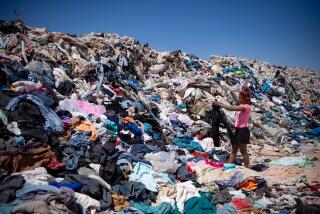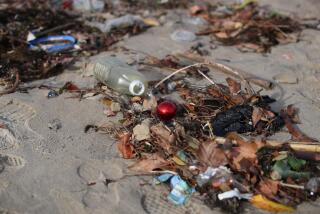Valley Perspective : Scavengers Show Us Who We Are : Trash pickers are greeted with disdain for cleaning up the mess that society’s ‘respectable’ people leave behind.
The day I perused a filthy, trash-strewn alley with anticipation, I suddenly realized just how much had changed. The sight of trash scavengers in my neighborhood, searching for bottles and cans, had always bothered me. It never occurred to me--middle-aged, middle-class, middle management--that one day I would become one of “them.”
Five years ago, I was found to have diabetes. To control my blood sugar, I began to walk every day for 30 minutes. At my pace, that’s 800 miles a year. Because I must exercise but often found it boring, I looked for distractions to maintain my resolve.
After a few months, I started to notice how very much trash is thrown on the ground. And how much of it is recyclable. I first carried one--and later, two--plastic grocery bags, filling them with ample quantities of bottles and cans. The hunt for recyclables was the challenge needed to keep me motivated. I felt Mother Earth was providing me with treasures. Although the value of each item I retrieved was modest, the aggregate from 800 miles of searching brought me roughly $200 a year in redemptions. I send this money to The Nature Conservancy, in order to give back to Mother Earth some of what we have taken from her.
The first time I suspected I had become a transgressor to the social pact, I was walking briskly on my way with my shopping bags full of treasure. There I was, wearing clean jeans and a sweatshirt--and expensive running shoes--when another woman roughly my age, also on her morning constitutional, glanced at me with alarm and disdain. I understood. That was the look I myself would have directed in the past to someone just like who I had become.
And so it went. The day I looked with glee down that filthy alley, I realized that miles are not the only gauge of how far I had traveled.
Why do scavengers dismay us?
Because they are the dark side of the mirror, reflecting the consequences of what we as a society do. People can be thoughtless, wasteful and dirty without sacrificing their social respectability. But those who collect all our litter and carry it away are not afforded the same privilege. Yet we are the ones who make “them” possible. By despoiling our communities and treating public space as someone else’s responsibility. By feeling entitled to have others clean up our own mess.
I am a dilettante scavenger, one who has enough food and clothing and a home. But the women and men who survive on what they collect, the destitute who search all day, every day, so they simply can eat, show us an uncomfortable perspective of who we are.
We find it hard to forgive them that view.


